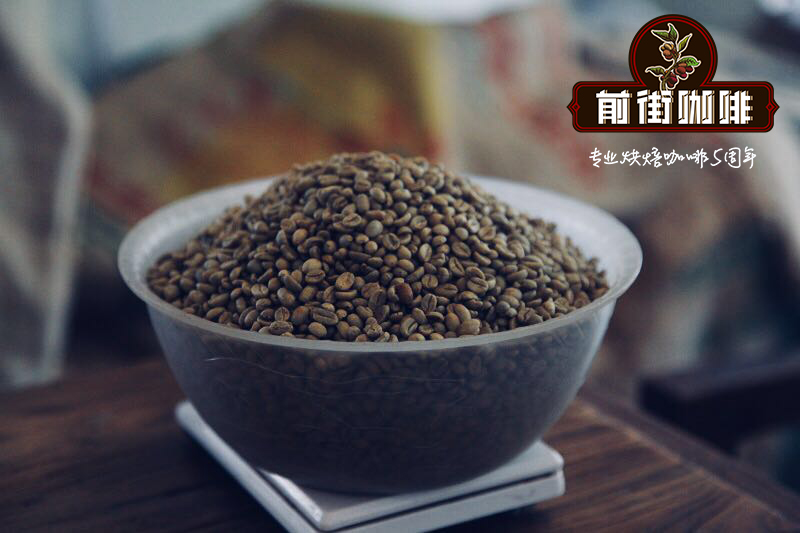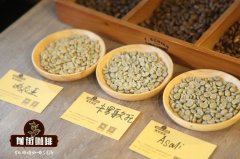How to buy authentic Kona coffee beans in Hawaii

Professional coffee knowledge exchange more coffee bean information please follow the coffee workshop (Wechat official account cafe_style)
Introduction to the Real labeling method of Hawaiian Coffee
Questions and answers to the Hawaiian Coffee labeling Act, let's see how they are accountable to producers and consumers.
It has already happened in Hawaii that imported beans are mixed with beans of origin. After the incident, their introspection contributed to and passed the "true marking method" with strong self-control.
q. Why is the "true labeling method" important to the Hawaiian coffee industry?
a. Most coffee beans baked and sold in Hawaii, although bearing the Hawaiian logo, are only 10% mixed beans (only 10% Hawaiian beans and 90% imported beans). The general public cannot understand this. Cognitively, they are indeed Hawaiian coffee beans (although nine out of every ten are not Hawaiian coffee beans). On the sign, the roaster is allowed to clearly mark the mixed coffee beans (30% or 50% Hawaiian beans, as opposed to only 10%).
Q: what are the benefits to the Hawaiian coffee industry?
A: the Hawaiian Coffee Association believes that this new labeling requirement has potential benefits for Hawaiian coffee production and increases the percentage of Hawaiian coffee products.
q. What are the benefits to consumers?
a. It is obviously in the interest of consumers, first of all, to make them more aware of what they are buying, and secondly to provide them with the ability to distinguish between mixed beans and 100% coffee beans. The requirements of the True labeling Act on commodity labeling must enable consumers to clearly distinguish between mixed Hawaiian beans and foreign beans, as well as 100% Hawaiian beans. HCA (Hawaiian Coffee Association) believes that it will help provide consumers with high-quality mixed beans that will increase the percentage of Hawaiian coffee beans.
q. What is the need for this new law? What is the role of HCA?
a. In response to complaints from the Japanese coffee industry about the adulteration of Hawaiian coffee beans, the Hawaiian Coffee Association (HCA) organized a committee on strategic development to formulate the mixed bean labelling law. The committee is made up of farmers, processors, bakers and retailers in the state. The College of Agriculture at the University of Hawaii assisted the committee in meeting for a few months and finally unanimously approved a new direction to be introduced to the Hawaiian Legislative Council.
After the provisions of the law were drawn up, it took the committee a year to explain to the state coffee industry.
A formal statement was made at the HCA2001 annual conference and held several meetings with industries such as The Kona Coffee Council of the Kona Coffee Council, Kona Farmer Alliance of the Kona Farmers' Union, Hawaii Farm Bureau of the Hawaiian Farm Management Board, and Kona Pacific Farmers Cooperative of the Kona Pacific Farmers' Cooperative. It is up to these organizations to propose a possible direction, and then amend the legal provisions.
Q: who is special and who is against it?
A: the bill was introduced in the Farm Management Bureau package bill during the opening of the Hawaiian Parliament in 2002. HCA of the Farm Management Bureau filed a complaint and followed the legislative process. There was no objection from the eight committees, and the bill (SB2169) was submitted to the governor for signature in April 2002.
q. Why not directly change the law to increase the percentage of Hawaiian coffee beans in mixed beans?
a. Frankly speaking, HCA did this at the beginning, but found that the minimum number of our members is 10%, 33% or 50%. We don't agree with each other. As we seek common ground, that is, consensus and good for the people, we find that it is a true sign-clearly telling consumers what they are buying. True labeling is a concept that is rarely controversial.
q. Does the new law require at least how many Hawaiian coffee beans should be contained in Hawaiian mixed beans?
a. Yes, but only in the case of mixed beans using Coffee Kona Coffee. As with the current law, it is required to use at least 10% of the Kona coffee beans. There are no rules for coffee beans in other parts of Hawaii.
q. How does the new law affect the current producers of coffee products in Hawaii?
a. If you are producing a coffee label, there must be some changes on your product label.
For people who use foreign beans mixed with coffee beans made in Hawaii, the actual percentage of Hawaiian coffee beans must be marked on the front label with the same size of Hawaiian origin. For example: now marked "Kona Blend", it must be changed to "_ _% Kona Blend". The requirement for "Contains not less than 10 per cent Kona Coffee" (containing at least 10 per cent of Coffee beans) has been excluded by the new law.
For 100% producers of Hawaiian products, the word "100%" must be marked on the front label of the same size as the Hawaiian origin.
q. Will coffee producers have to abandon existing labels when the new law is passed?
a. No, the new law gives producers an one-year buffer period to continue to use the current label.
q. How can the public find information about the new law?
a. The The Hawaii Coffee Association of the Hawaiian Coffee Association will post the new law on its website at www.hawaiicoffeeassoc.org, and anyone who creates a label should notify Diane Yamamoto (808) 973-9563 of the Department of Agriculture's quality Assurance Service.
q. Why do you mention more Hawaiian coffee than Kona coffee?
A. HCA mentioned all the coffee produced in Hawaii, not just Kona coffee, so we tend to use Hawaiian coffee in our talk. When we refer to Hawaiian coffee, we mean recognized Hawaiian origin, including Kona, Kauai, Molokai, Oahu and Maui, and it is called Hawaii origin, which contains 100% Hawaiian coffee beans, whether it is a single island or a combination of different islands.
q. What is HCA?
a. The Hawaiian Coffee Association represents every part of the Hawaiian coffee industry. Our leaders and members include coffee growers, roasters, wholesalers and retailers, coffee researchers and representatives of other coffee associations. The purpose of the Hawaiian Coffee Association is to promote the consumption of coffee produced in the state of Hawaii by educating and informing sellers and consumers.
Our website: www.hawaiicoffeeassoc.org
HCA is an umbrella organization approved by the Department of Agriculture of the State of Hawaii. We are the leaders of several representative organizations, namely, the Kona Coffee Council Kona Coffee Council, the Kona Farmers Union The Kona Farmers Alliance, and the Hawaiian Coffee producers Association Hawaii Coffee Growers Association. We are involved in coffee research with Hawaii Agricultural Research Center of the Hawaiian Agricultural Research Center and University of Hawaii College of Tropical Agriculture and Human Resources of the School of Tropical Agriculture and Human Resources at the University of Hawaii. However, over the past two years, we have focused on the integration of market and education and found that the true labeling of Truth In Labeling is an effective way to meet these issues.
Related topics
q. Why is that coffee so expensive?
a. Over the past 150 years, the coffee industry in Kona has grown from an average of 3-5 acres of small farmers. The products of these farms are mainly picked by hand. Compared with other coffee countries, the price of its products must be much higher. However, the region's famous "coffee belt" (1000 to 2500 feet above sea level) has the perfect coffee growing environment and has been producing the best quality coffee in the world for 150 years.
Due to the limited production of coffee per unit area, the market popularity has developed for many years, and people have been willing to buy Kona coffee at a higher price.
q. How to distinguish coffee from different islands and Kona islands?
a. We live in Hawaii and appreciate the quality and aroma of coffee between different islands. We have prepared a new brochure from the Hawaiian Coffee Association introducing the quality of coffee on each island. At the same time, provide experienced experts to act as coffee commentators in various regions.
Qianjie coffee: Guangzhou bakery, the store is small but a variety of beans, you can find a variety of unknown beans, but also provide online store services.
Https://shop104210103.taobao.com
Related recommendation: Hawaiian kona Kona Coffee introduces how to brew Hawaiian Kona Coffee
Important Notice :
前街咖啡 FrontStreet Coffee has moved to new addredd:
FrontStreet Coffee Address: 315,Donghua East Road,GuangZhou
Tel:020 38364473
- Prev

The reason why Hawaiian Kona coffee is famous how much is Hawaiian Kona coffee beans
Professional coffee knowledge exchange more coffee bean information please follow the coffee workshop (Wechat official account cafe_style) Kona coffee why is so expensive? Across latitudes 19 to 22 degrees, south of the Tropic of Cancer, the Hawaiian archipelago, blown by trade winds, is a perfect coffee growing area. In the volcanic soil and tropical climate, supplemented by slight humidity, regular afternoon array
- Next

What are the characteristics of Hawaiian Kona coffee? the flavor of Hawaiian Kona coffee is worth recommending.
Professional coffee knowledge exchange more coffee bean information please follow the coffee workshop (Wechat official account cafe_style) [product name] Hawaiian Kona Coffee (Hawaii Kona Coffee) [quality rating]: extra good (Extra Fancy) [roasting degree] recommended roasting degree medium deep roasting (High Roast or City Roast) [grade] excellent [granulated] ★★★★
Related
- Detailed explanation of Jadeite planting Land in Panamanian Jadeite Manor introduction to the grading system of Jadeite competitive bidding, Red bid, Green bid and Rose Summer
- Story of Coffee planting in Brenka region of Costa Rica Stonehenge Manor anaerobic heavy honey treatment of flavor mouth
- What's on the barrel of Blue Mountain Coffee beans?
- Can American coffee also pull flowers? How to use hot American style to pull out a good-looking pattern?
- Can you make a cold extract with coffee beans? What is the right proportion for cold-extracted coffee formula?
- Indonesian PWN Gold Mandrine Coffee Origin Features Flavor How to Chong? Mandolin coffee is American.
- A brief introduction to the flavor characteristics of Brazilian yellow bourbon coffee beans
- What is the effect of different water quality on the flavor of cold-extracted coffee? What kind of water is best for brewing coffee?
- Why do you think of Rose Summer whenever you mention Panamanian coffee?
- Introduction to the characteristics of authentic blue mountain coffee bean producing areas? What is the CIB Coffee Authority in Jamaica?

